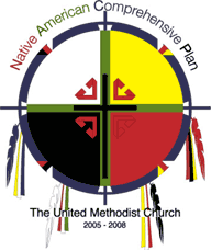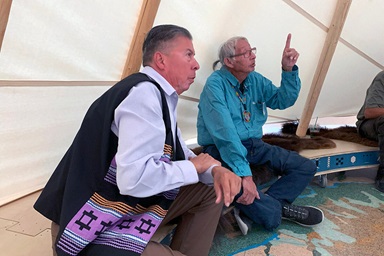
Board members of the United Methodist Native American Comprehensive Plan are supporting an appeal to the denomination's top court regarding a decision to cut another Native American program.
After a recent meeting, the board sent a letter to the Judicial Council regarding the appeal filed by the United Methodist Commission on Religion and Race. The appeal focuses on a recommendation made by the denomination's General Council on Finance and Administration to the 2004 General Conference to withhold funding from the National United Methodist Native American Center and merge it with the Native American Comprehensive Plan in the 2005-2008 quadrennium.
According to the Rev. David Wilson, chairperson of the Native American Comprehensive Plan, center officials have been going through the appropriate procedures to address the Judicial Council since the 2004 General Conference. Now that a petition has been filed, "we (NACP) felt that it was appropriate to state our support of the Native American Center's actions," Wilson said.
The Comprehensive Plan is supporting the center's appeal to be in solidarity with Native American entities in the United Methodist Church. Wilson said GCFA's recommendation to withhold funding from the National United Methodist Native American Center and merge it with the Native American Comprehensive Plan "enacted a wedge between the two entities" and has caused "us to defend what we do" and "causes us to continue to talk about our validity" as separate bodies.
The commission is asking the council to rule whether the application of Paragraph 811.2 in the United Methodist Book of Discipline would affect the recommendation and to restore operating funds to the center.
The paragraph states that GCFA "may withhold approval of any item or items in the budget or budgets receiving general Church funds (see 810.2) that in its judgment represent unnecessary duplication of administrative function; in cooperation with and on recommendation of the General Council of Ministries, it may withhold approval of any such item that represents unnecessary duplication of program within an agency or between two or more agencies."
According to Religion and Race, the now-defunct General Council on Ministries had not recommended any such withholding of funds for the Native American Center. Their question to the Judicial Council is: "If the GCFA recommendation was not appropriate, did the General Conference incorrectly approve it?"
In their letter, board members of the Native American Comprehensive Plan said they are concerned that:
- • GCFA took such action without consulting with the parties involved and affected by the action.
- • These kinds of actions are viewed by the Native American community as justice issues with much wider and insidious implications.
- • Such actions tend to divide the Native American constituency and pit one group of Native Americans against another.
- • The two programs involved are very different from each other and cannot be "lumped together."
- • The GCFA action would dismantle more than half of the existing infrastructure serving Native American communities through the United Methodist Church.
- • The action puts all United Methodist Native American programming in jeopardy.
The Commission on Religion and Race assists racial/ethnic groups in the denomination "with programs of empowerment and ministry to their local churches and communities" and thus has a "close working relationship" with the Native American center, which focuses on training and support of Native Americans for ordination and church leadership positions.
"The practice of decision-making on behalf of Native American programs and ministries is often done where there is no Native American representation," the appeal stated.
A third church-related Native American organization, in addition to the center and Native American Comprehensive Plan, is the Native American International Caucus.
"Each organization is dedicated to a specific area of Native American presence and empowerment within the life of the church," the appeal noted. "Loss of funds and the merging of two of the three organizations have reduced support for Native American programs and ministries; ultimately it will diminish the presence and gifts that Native Americans bring to the church."
The Native American Comprehensive Plan hopes that the Judicial Council rules in favor of the United Methodist Native American Center so that it can return its focus toward "the tremendous larger issue" of recruitment, deployment and retention of Native American clergy for the United Methodist Church, Wilson said.
"In making budget recommendations to the 2004 General Conference, the General Council on Finance and Administration carefully considered all funding requests in light of the council's disciplinary responsibilities," said Marsha Base, the finance agency's director of communications.
"The recommendation that was approved by the General Conference to merge the National United Methodist Native American Center and the Native American Comprehensive Plan was made by GCFA in concert with the General Council on Ministries and in compliance with the Book of Discipline.
"Like everyone else, GCFA awaits the decision of the Judicial Council in regard to the concerns raised by the General Commission on Religion and Race," Base said.
*Bloom is a United Methodist News Service news writer based in New York.
News media contact: Linda Bloom, New York, (646) 369-3759 or [email protected].
Like what you're reading? Support the ministry of UM News! Your support ensures the latest denominational news, dynamic stories and informative articles will continue to connect our global community. Make a tax-deductible donation at ResourceUMC.org/GiveUMCom.



